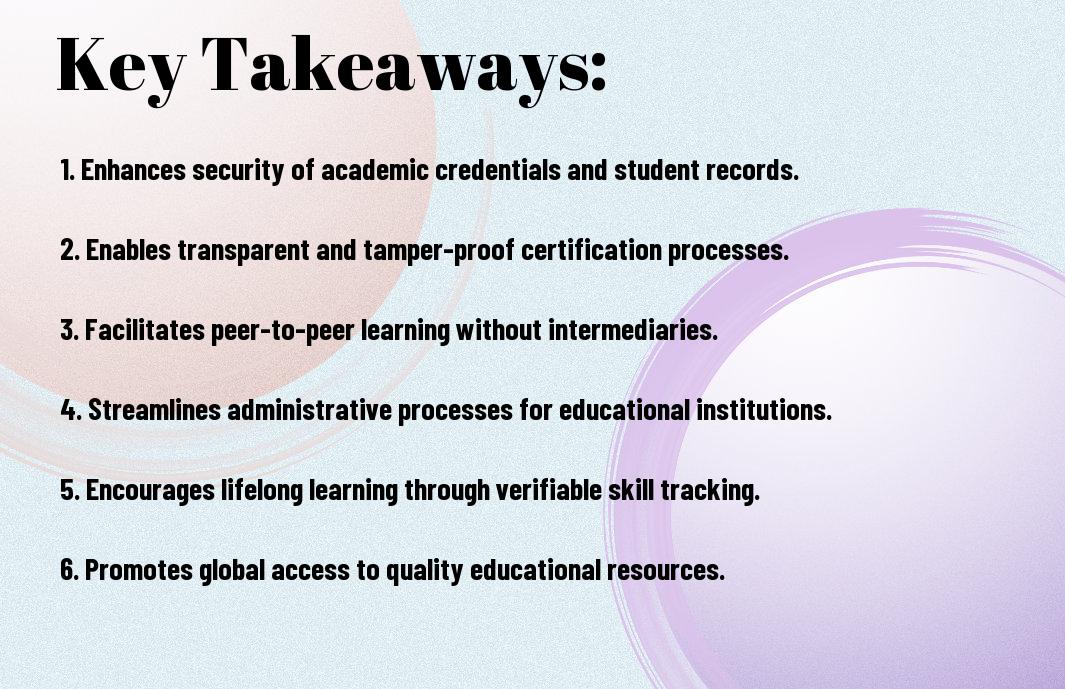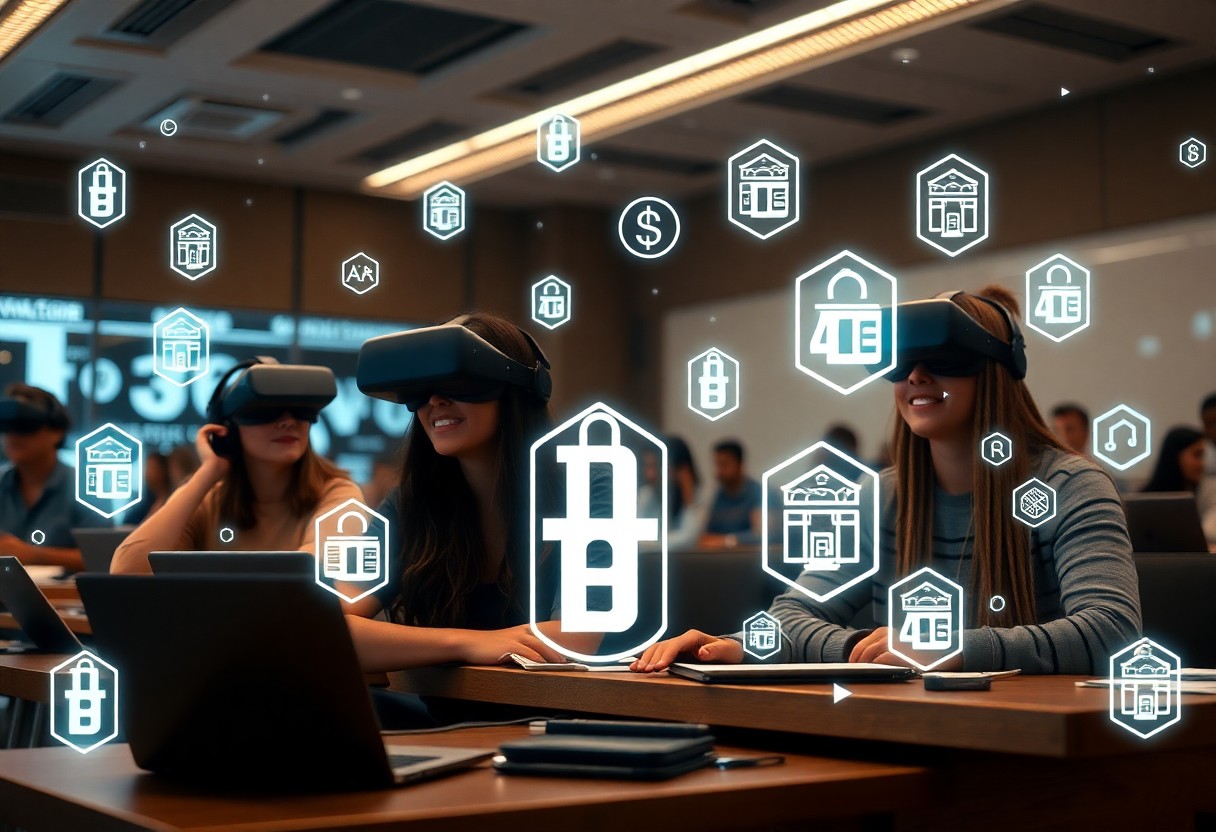As you explore the frontier of online education, you may wonder how blockchain technology is revolutionizing this field. You can learn about the ways in which blockchain is transforming the way educational institutions operate by reading about BLOCKCHAIN IMPLEMENTATION AND BENEFITS in online education, enabling secure and efficient management of student records, certificates, and learning pathways. Your understanding of this technology will help you appreciate its potential to enhance your online educational experience.
Key Takeaways:
- The Decentralized nature of Blockchain technology can provide a secure and transparent way to verify the authenticity of academic certificates and degrees, making it difficult for individuals to falsify their educational credentials.
- Blockchain-based systems can facilitate the creation of a Decentralized and Immutable record of student learning outcomes, allowing for more accurate and reliable tracking of student progress and achievement.
- The use of Smart Contracts on the Blockchain can automate the process of issuing and verifying academic credentials, reducing administrative burdens and costs associated with traditional methods.
- Blockchain-based platforms can enable Secure and Private sharing of student data, ensuring that sensitive information is protected from unauthorized access and misuse.
- The application of Blockchain technology in online education can promote Lifelong Learning by providing individuals with a Portable and Verified record of their educational achievements, which can be easily shared with employers, educational institutions, and other relevant parties.
Foundations of Blockchain Technology
Before entering into the applications of blockchain in online education, you need to understand the underlying technology. Blockchain is a decentralized system that enables secure and transparent data management. You will explore the core components of blockchain, including distributed ledger systems and cryptographic algorithms, to comprehend its potential in education.
Overview of Distributed Ledger Systems
Logically, a ledger system is at the heart of blockchain technology, allowing you to store and manage data in a decentralized manner. You will discover how distributed ledger systems enable multiple parties to access and update the ledger simultaneously, ensuring data consistency and integrity.
Security and Transparency in Blockchain
Technologically, blockchain offers advanced security features, such as encryption and hashing, to protect your data from unauthorized access. You will learn how these features ensure the integrity and transparency of the data, making it an attractive solution for online education.
Further, as you investigate deeper into the security aspects of blockchain, you will notice that the technology utilizes a consensus mechanism to validate transactions, preventing any single entity from manipulating the data. This ensures that your data is not only secure but also trustworthy, which is crucial for online education where accuracy and reliability are paramount.


Advantages of Blockchain in Education
There’s a multitude of benefits that blockchain technology can bring to the online education sector, and as you explore this innovative field, you’ll discover the vast potential it holds for transforming the way you learn and interact with educational institutions.
Enhanced Security and Authentication
Along with the integration of blockchain, you can expect a significant boost in security and authentication measures, allowing you to trust the integrity of your academic records and personal data, as it is stored and transmitted in a secure and decentralized manner.
Increased Efficiency and Automation
By leveraging blockchain’s capabilities, you can streamline various administrative tasks, such as certificate verification and payment processing, making the overall educational experience more efficient and convenient for you, the learner.
In fact, as you research deeper into the applications of blockchain in education, you’ll find that automation enables the instantaneous issuance of certificates and diplomas, reducing the administrative burden on institutions and allowing you to access your credentials at any time, thereby enhancing your overall learning experience and providing you with greater control over your academic achievements.
Applications of Blockchain in Online Learning
All educational institutions can benefit from blockchain technology, which offers a secure and transparent way to manage online learning. You can use blockchain to create a decentralized system for storing and verifying academic records, making it easier for you to manage your credentials.
Digital Badges and Certificates
Offering a secure way to store and display your achievements, blockchain-based digital badges and certificates provide you with a unique way to showcase your skills. You can use these badges to demonstrate your expertise in a particular area, and they can be easily verified by employers or academic institutions.
Personalized Learning Paths and Assessment
Around the concept of personalized learning, blockchain technology can help you create a tailored learning experience. You can use blockchain to track your progress, identify areas where you need improvement, and receive recommendations for further learning, allowing you to create a personalized learning path that suits your needs.
The ability to create personalized learning paths and assessments is a significant advantage of using blockchain in online education. You can use blockchain-based systems to track your learning outcomes, and the technology can help you identify the most effective learning strategies for your individual needs. As you progress through your learning journey, the blockchain-based system can provide you with real-time feedback and recommendations, enabling you to adjust your learning path accordingly, and helping you to achieve your academic goals more efficiently.
Potential Challenges and Limitations
To effectively implement blockchain in online education, you must consider the potential hurdles that may arise. You will encounter various challenges that can impact the adoption and integration of this technology in educational settings.
Scalability and Interoperability Issues
Towards addressing the limitations of blockchain, you should examine the scalability and interoperability issues that may hinder its widespread adoption in online education. You will need to consider how these issues affect your implementation plans.
Regulatory Frameworks and Compliance
Any attempts to integrate blockchain in online education will require you to navigate complex regulatory frameworks and ensure compliance with existing laws. You must consider how these frameworks impact your plans for blockchain implementation.
Understanding the regulatory frameworks and compliance issues is important for you to successfully integrate blockchain in online education. You will need to research into the specifics of data protection, intellectual property, and accreditation standards to ensure that your blockchain-based systems meet the necessary requirements, thereby facilitating a seamless and legitimate educational experience for your users.
Emerging Trends and Innovations
Not surprisingly, the integration of blockchain in online education is paving the way for new developments. You can explore more about The Future Of Blockchain Technology In Education to understand its potential. This emerging technology is transforming the way you approach online learning.
Artificial Intelligence and Blockchain Convergence
The synergy between artificial intelligence and blockchain is creating new opportunities for personalized learning experiences. You will notice that this convergence enables more efficient and adaptive education systems, allowing you to learn at your own pace.
Blockchain-based Virtual Learning Environments
Blockchain-based learning environments are becoming increasingly popular, offering you a secure and transparent way to access educational resources. You can expect to see more immersive and interactive learning experiences, making online education more engaging and effective.
In fact, as you examine deeper into blockchain-based virtual learning environments, you will discover that they provide a decentralized and autonomous way to manage educational data, allowing you to have greater control over your learning journey. You will be able to access a wide range of courses and educational materials, and even create your own customized learning paths, all while ensuring the integrity and security of your personal data.
Implementation and Integration Strategies
After considering the potential of blockchain in online education, you can explore ways to implement and integrate it into your existing systems, as seen in studies on Unlocking the power of blockchain in education, to enhance your educational offerings.
Technical Infrastructure and Support
Following the decision to adopt blockchain technology, you will need to assess your technical infrastructure and support to ensure a seamless integration, taking into account the necessary hardware, software, and networking requirements.
Faculty Training and Professional Development
Around the time you begin implementing blockchain, you should also consider providing your faculty with training and professional development opportunities to help them effectively utilize this new technology in their teaching practices.
This faculty training and professional development is imperative, as it will enable your educators to create engaging and interactive learning experiences, leveraging the unique features of blockchain, such as smart contracts and decentralized data management, to enhance student outcomes and overall educational quality, allowing you to fully harness the potential of blockchain in your online education programs.
Conclusion
Summing up, you now have a comprehensive understanding of the role of blockchain in online education. As you consider implementing this technology, you will be able to enhance the security and transparency of your educational platforms, allowing you to focus on providing high-quality learning experiences for your students. By leveraging blockchain, you can create a more efficient and trustworthy online education system, ultimately benefiting both educators and learners alike. Your exploration of blockchain’s potential will likely lead to innovative solutions in the field.
FAQ
Q: What is the role of blockchain in online education, and how does it enhance the learning experience?
A: The role of blockchain in online education is multifaceted, primarily focusing on enhancing security, transparency, and accessibility. By utilizing blockchain technology, educational institutions can securely store and manage academic records, such as diplomas and transcripts, making it easier for students to share their credentials with potential employers or other educational institutions. Moreover, blockchain-based platforms can facilitate the creation and distribution of digital badges and micro-credentials, allowing learners to demonstrate specific skills and knowledge acquired through online courses. This not only enriches the learning experience but also provides a more comprehensive view of a learner’s capabilities beyond traditional degree certifications.
Q: How does blockchain technology ensure the authenticity and integrity of online educational content and credentials?
A: Blockchain technology ensures the authenticity and integrity of online educational content and credentials through its inherent characteristics of decentralization, immutability, and transparency. Once educational content or a credential is recorded on a blockchain, it becomes part of a permanent and unalterable ledger. This means that any attempt to tamper with or alter the content or credential would be detectable, thereby preventing fraud and ensuring that the information remains trustworthy. Furthermore, blockchain-based systems can automate the verification process of educational credentials, saving time and reducing the administrative burdens on educational institutions and employers alike.
Q: Can blockchain contribute to making online education more inclusive and accessible, and if so, how?
A: Yes, blockchain can significantly contribute to making online education more inclusive and accessible. By leveraging blockchain technology, educational platforms can offer personalized learning pathways tailored to individual learners’ needs and preferences. Additionally, blockchain can facilitate the development of community-driven platforms where learners can contribute, share, and access educational resources, promoting a collaborative learning environment. The use of cryptocurrencies and blockchain-based payment systems can also streamline financial transactions related to online courses, potentially lowering barriers to access for learners from economically disadvantaged backgrounds. This democratization of access to educational resources has the potential to significantly expand the reach of online education globally.